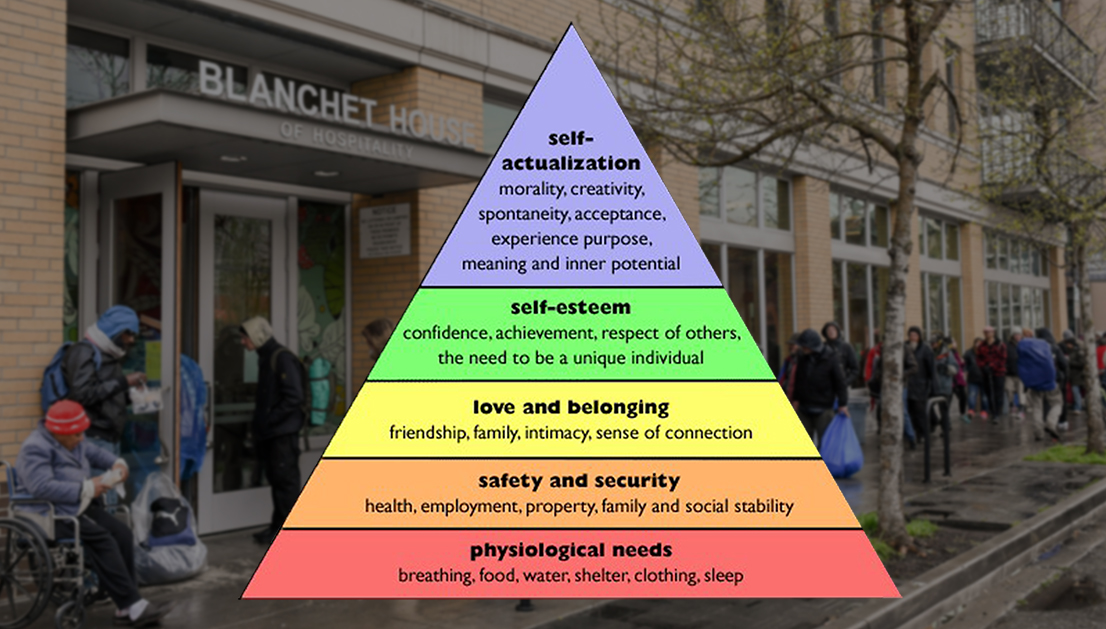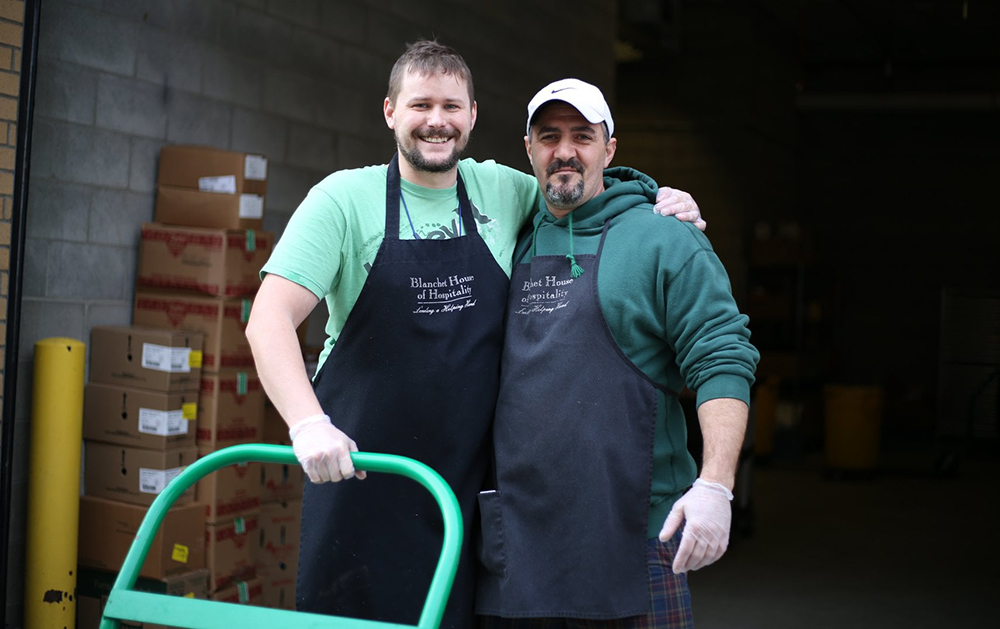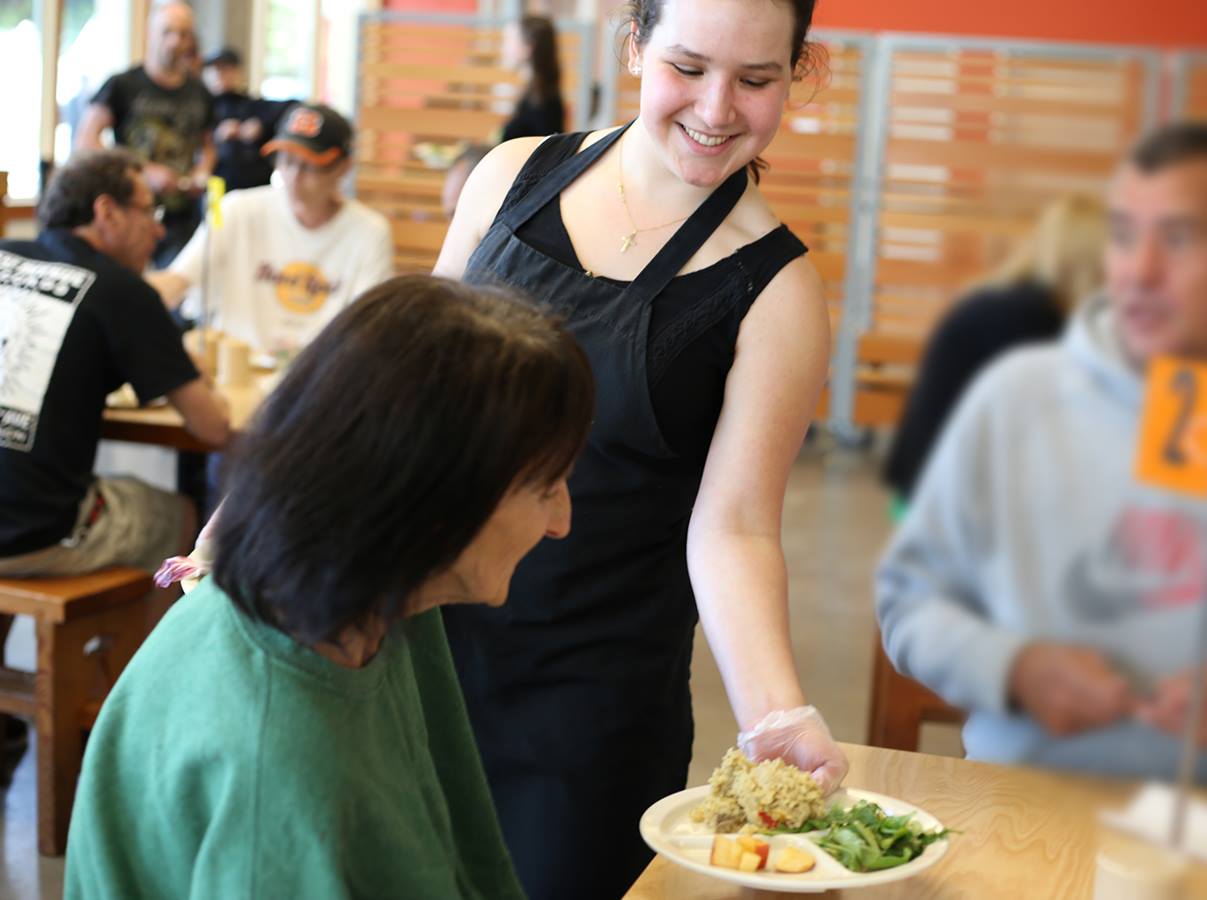From Survive to Thrive: Maslow’s 5 Levels of Human Need
By Natalie Conway
What do people need to reach their full potential and thrive? In the case of someone experiencing homelessness, they first need to have their most basic human needs met reliably every day.
According to psychologist Abraham Maslow, human beings’ physiological needs for food, water, clothing, shelter, and sleep must be satisfied in order for them to address more complex needs like mental and physical health, relationships, sobriety, long-term housing, and employment.
7 Ways to Help People Experiencing Homelessness >>
Maslow’s Hierarchy of Needs
In 1943, Maslow developed a Hierarchy of Needs to explain the five levels every human being must progress through to self-actualization. Most homeless people are seeking to achieve their physiological needs and the search for food, clothing, and shelter is prioritized above everything else. Understanding how humans progress up the ladder of needs can help us better understand what support people need to reach self-sufficiency. Maslow suggested that “higher” needs can begin to develop even when “lower” needs are not fully satisfied.
1. Physiological Needs
Food, water, clothing, sleep, and shelter are the bare necessities for anyone’s survival. For many people, these basic needs can not be met without the aid of charitable organizations. A reliable place to receive a meal can be what’s needed for a person to focus on obtaining higher needs.
Six days per week, Blanchet House offers free hot meals, water, clean clothing, and toiletries to anyone who comes to their doors seeking aid. Out on the sidewalk volunteers and staff direct houseless guests to partner organization’s services such as mental and physical health care or emergency shelter. Sometimes staff of Blanchet House is able to welcome a meal guest into its transitional housing program if they are a good fit. Transitional housing programs provide a safe and supportive place for people to gain sobriety, health, and stability before pursuing the next steps.
Discussions and planning for the next steps can only occur after immediate needs have been met.
2. Safety and Security
Once a person’s basic needs are satisfied, the want for order and predictability sets in. There are many barriers that may prevent people experiencing homelessness from finding job security and building a stable social network. Substance abuse, trauma, and PTSD, and mental or physical health challenges are difficult to address without a long-term safe place to live. The first step to helping someone toward self-sufficiency is making sure their basic need for safety and security are met by providing shelter. A permanent address is critical. Only then can most people begin to apply for employment, education, or disability.
“If you’ve never had a resume, you can’t picture yourself in a lot of different kinds of jobs,” says Kristi Katzke, a Case Manager at Blanchet House of Hospitality. Her job is to support people transitioning from homelessness to housing. “We start with small accomplishments, and guide them in working their way up.”
Programs like the one offered by Blanchet House provide a path toward recovery and stability – and just as importantly, an opportunity to engage in meaningful work. Temporary shelters require guests to vacate the premises every morning and then line up again at night. They are intended for emergencies.
3. Love and Belonging
Everyone yearns for family and connection. For people living on the streets, it can be especially hard to find a welcoming community. Many folks are traumatized and find themselves without housing after experiencing domestic violence, abuse, or addiction, and mental health challenges. Many people living unhoused find themselves estranged from family and friends
Many meal guests rely on Blanchet House not just for food, but for a connection to others. Everyone deserves a non-judgmental space where they can feel welcome.
“If people are fed, housed, and cared for, the hope is that change will happen internally,” says Katzke.
4. Esteem
Gaining confidence and the respect of others is an important step for people working to maintain employment and recover from addiction. Only after finding love and belonging, can people then work on building healthy relationships with themselves and others.
“We offer support and space where people can try,” says Katzke of the eight-month residential program focused on meaningful volunteer work offered at Blanchet House. “Residents see themselves as valued, and as an important part of society.”
Many people have been unsuccessful with relationships in the past and hold the fear of failure close to them. A supportive program that focuses on peer-support and accountability can lay a foundation for self-esteem and community-building. People can gain confidence in their work and in themselves again.
5. Self-Actualization
According to Maslow, we all crave a purposeful life. There’s nothing more rewarding than feeling like you’ve reached your highest potential. However, this final step looks and feels different for everyone.
“Really, it’s about opening up their eyes to what the possibility is, and then being there to support them as they explore that,” Katzke says about supporting the residents at Blanchet House.
Solutions to homelessness focus on providing meals, housing, and clothing – but we shouldn’t stop there. After these basic needs have been met, all people deserve to find fulfillment, happiness, and growth in all areas of their life.
Maslow’s findings suggest that we not ask what is wrong with someone but rather focus on what they need. Instead of asking “Why is that person homeless?” ask “What does that person need?”

















